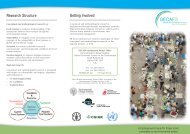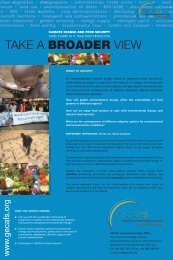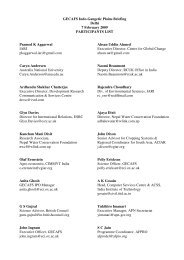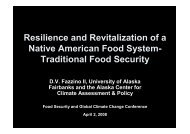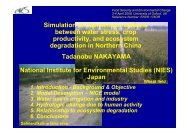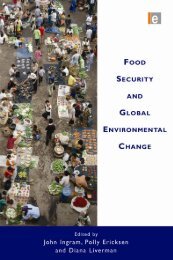From Food Production to Food Security - Global Environmental ...
From Food Production to Food Security - Global Environmental ...
From Food Production to Food Security - Global Environmental ...
- No tags were found...
Create successful ePaper yourself
Turn your PDF publications into a flip-book with our unique Google optimized e-Paper software.
Box 7 The GECAFS stakeholder survey.After about five years of project activities, GECAFS designed and conducted an email surveyintended <strong>to</strong> assess the effectiveness of reaching out <strong>to</strong> a broad user community (i.e. stakeholders), andalso <strong>to</strong> gather feedback on ways in which <strong>to</strong> better serve their needs in future.Questions covered a range of aspects including the nature of respondents’ interactions with GECAFSsuch as: Does/did your engagement contribute positively <strong>to</strong> your work? Are there any specific formsof interaction that you have had with GECAFS that you found particularly useful for your work? Canyou suggest any ways in which GECAFS can contribute more substantially <strong>to</strong> your work? And moregeneral issues such as: Who, in your opinion, should GECAFS seek <strong>to</strong> influence with its researchwork and findings? Can you suggest ways in which GECAFS can strengthen its presence amongnational and regional stakeholders in your region? To what extent, in your opinion, does GECAFScontribute <strong>to</strong> making linkages between science and policy-making? Can you suggest any ways inwhich <strong>to</strong> strengthen this contribution?Other questions cover a range of issues such as the nature and format of GECAFS workshops, thewebsite, and the desirability of a newsletter. Feedback was received from about 30 of the ca. 100recipients.Almost all the participants in the survey felt that their interaction with GECAFS had contributedpositively <strong>to</strong> their work in concrete ways, and many were able <strong>to</strong> cite specific examples (‘it expandedmy interaction outside the notion of climate change and agricultural production <strong>to</strong> a food system asdefined by GECAFS’).Most respondents felt workshops and meetings were the most beneficial form of interaction they hadwith GECAFS in the past, allowing for a better understanding of GECAFS concepts, as well aspresenting an opportunity for interaction with policy-makers and for networking (‘allowed interactionwith some of the finest scientists in vulnerability science, environmental economist, agriculturalproduction etc.’).In specific relation <strong>to</strong> stakeholder engagement, most of the respondents felt that GECAFS’ key targetgroups should be policy and decision-making communities at the global, regional and national levels,and the science community. Policy-makers specifically identified include politicians, PermanentSecretaries, Chief Technical Officers in ministries responsible for fisheries, agriculture, environment,industry and finance, and fisher folk leaders, agriculture department officials and opinion leaders inrural communities. In addition <strong>to</strong> the policy and science communities, other target groups identifiedby the respondents include donors; relevant practitioners and stakeholders including representatives ofagro-business, farmers, food consumers, producers and traders; international agencies such as FAO(United Nations <strong>Food</strong> and Agricultural Organization) and CGIAR; universities (researchers andstudents); media; NGOs; and relevant research and development institutions.Several respondents felt, however, that GECAFS outreach <strong>to</strong> these communities was limited. Somecited possible reasons for this – including the need <strong>to</strong> have something substantial <strong>to</strong> offer beforecommitting <strong>to</strong>o much time <strong>to</strong> outreach, in terms of both findings and resources for further research;the need for funding <strong>to</strong> carry out work at the regional and national levels, as it is difficult <strong>to</strong> reach out<strong>to</strong> politicians and other decision-makers without concrete results; and the difficulties in engaging84



